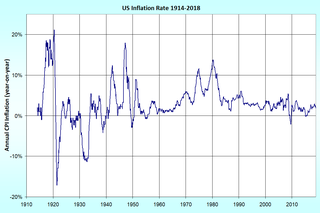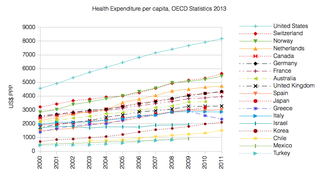Compensation for inflation
In Belgium, many wages, pensions, property rental costs, insurance premiums, unemployment benefits, health insurance payments, etc. are by law tied to the Health Index. Some wages and benefits are adapted to the Index after a rise of the Index above a certain threshold. Other adjustments, like house rent or insurance premiums, are carried through on a yearly basis. Thus, the income of the average Belgian closely tracks overall inflation - which makes it different from the rest of the eurozone.
Government cabinets can decide to "jump" the index, i.e. knowingly skip the automatic adaptation of all wages and benefits tied to the index. This is a political decision that keeps these wages and benefits on the then-current level, in order to reduce the government's budget deficit. The Wilfried Martens government in the 1980s did three such "index jumps", and the Michel I Government did one as well in 2015.

Wilfried Achiel Emma Martens was a Flemish Belgian politician. He was born in Sleidinge. During his political career, Martens served as the Prime Minister of Belgium from 3 April 1979 to 6 April 1981 and 17 December 1981 to 7 March 1992.

The Michel I Government was the Federal Government of Belgium formed following the 2014 Belgian government formation and sworn in on 11 October 2014. The administration is a centre-right coalition of the New Flemish Alliance (N-VA), the Christian Democratic and Flemish (CD&V), the Open Flemish Liberals and Democrats and the Reformist Movement (MR). The prime minister is Charles Michel. The government had an agenda of socio-economic reforms, especially through austerity measures, with its priorities being improving Belgium's economic competitiveness and reducing unemployment. It fell in December 2018 over the Global Compact for Migration.

Insurance is a means of protection from financial loss. It is a form of risk management, primarily used to hedge against the risk of a contingent or uncertain loss.

In economics, inflation is a sustained increase in the general price level of goods and services in an economy over a period of time. When the general price level rises, each unit of currency buys fewer goods and services; consequently, inflation reflects a reduction in the purchasing power per unit of money – a loss of real value in the medium of exchange and unit of account within the economy. A chief measure of price inflation is the inflation rate, the annualized percentage change in a general price index, usually the consumer price index, over time. The opposite of inflation is deflation.

Price discrimination is a microeconomic pricing strategy where identical or largely similar goods or services are transacted at different prices by the same provider in different markets. Price discrimination is distinguished from product differentiation by the more substantial difference in production cost for the differently priced products involved in the latter strategy. Price differentiation essentially relies on the variation in the customers' willingness to pay and in the elasticity of their demand.

A Consumer Price Index measures changes in the price level of market basket of consumer goods and services purchased by households.

Pricing is the process whereby a business sets the price at which it will sell its products and services, and may be part of the business's marketing plan. In setting prices, the business will take into account the price at which it could acquire the goods, the manufacturing cost, the market place, competition, market condition, brand, and quality of product.
Health economics is a branch of economics concerned with issues related to efficiency, effectiveness, value and behavior in the production and consumption of health and healthcare. In broad terms, health economists study the functioning of healthcare systems and health-affecting behaviors such as smoking.
A market basket or commodity bundle is a fixed list of items, in given proportions, used specifically to track the progress of inflation in an economy or specific market.
Health insurance is an insurance that covers the whole or a part of the risk of a person incurring medical expenses, spreading the risk over a large number of persons. By estimating the overall risk of health care and health system expenses over the risk pool, an insurer can develop a routine finance structure, such as a monthly premium or payroll tax, to provide the money to pay for the health care benefits specified in the insurance agreement. The benefit is administered by a central organization such as a government agency, private business, or not-for-profit entity.
The Pharmaceutical Benefits Scheme (PBS) is a program of the Australian Government that provides subsidised prescription drugs to residents of Australia, as well as certain foreign visitors covered by a Reciprocal Health Care Agreement. The PBS seeks to ensure that Australian residents have affordable and reliable access to a wide range of necessary medicines. The PBS has faced increased scrutiny as its cost has increased. The scheme assumes responsibility for the cost of drugs to patients in the community setting rather than while in hospital which is the responsibility of each state and territory. Together with Medicare the PBS is a key component of health care in Australia.
The Federal Employees Health Benefits (FEHB) Program is a system of "managed competition" through which employee health benefits are provided to civilian government employees and annuitants of the United States government. The government contributes 72% of the weighted average premium of all plans, not to exceed 75% of the premium for any one plan.
Long-term care insurance is an insurance product, sold in the United States, United Kingdom and Canada that helps pay for the costs associated with long-term care. Long-term care insurance covers care generally not covered by health insurance, Medicare, or Medicaid.

Healthcare in Switzerland is universal and is regulated by the Swiss Federal Law on Health Insurance. There are no free state-provided health services, but private health insurance is compulsory for all persons residing in Switzerland.

The United States Consumer Price Index (CPI) is a set of consumer price indices calculated by the U.S. Bureau of Labor Statistics (BLS). To be precise, the BLS routinely computes many different CPIs that are used for different purposes. Each is a time series measure of the price of consumer goods and services. The BLS publishes the CPI monthly.
Medibank Private Limited is a national private health insurer based in Australia. It is Australia's second largest health insurance provider behind Bupa with 3.8 million members, 29.1% of the market, under two brands. Previously an Australian government business enterprise, it was privatised in 2014 by the Abbott Government and now operates as a publicly listed company on the ASX.

The Equal Treatment in Goods and Services Directive 2004 of 13 December 2004 is a directive which prohibits both direct and indirect sexual discrimination in the provision of goods and services in the European Union.
Health insurance in the United States is any program that helps pay for medical expenses, whether through privately purchased insurance, social insurance, or a social welfare program funded by the government. Synonyms for this usage include "health coverage", "health care coverage", and "health benefits". In a more technical sense, the term "health insurance "is used to describe any form of insurance providing protection against the costs of medical services. This usage includes private insurance and social insurance programs such as Medicare, which pools resources and spreads the financial risk associated with major medical expenses across the entire population to protect everyone, as well as social welfare programs like Medicaid and the Children's Health Insurance Program, which both provide assistance to people who cannot afford health coverage.
This page lists details of the consumer price index by country
In the United States, health insurance marketplaces, also called health exchanges, are organizations in each state through which people can purchase health insurance. People can purchase health insurance that complies with the Patient Protection and Affordable Care Act at ACA health exchanges, where they can choose from a range of government-regulated and standardized health care plans offered by the insurers participating in the exchange.
The National Consumer Price Index measures the price inflation of key consumer goods for Swiss private households. The average of the population is used as a reference to obtain a "truthful" value. The CPI measures the price trend based on a basket of commodities containing about 1050 goods and services. These are weighted according to their share of the household budget.
The Patient Protection and Affordable Care Act (ACA) established the health insurance rate review program in order to protect consumers from unreasonable rate increases. Through this program, proposed premium increases in the small group and individual markets that are above a threshold amount are reviewed by states or the federal government to determine whether the increases are reasonable.










